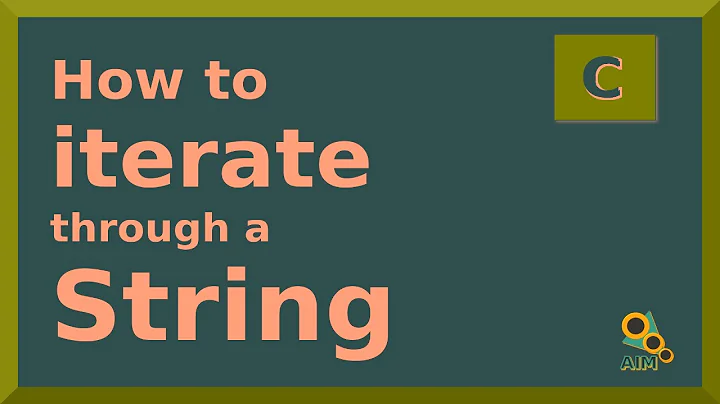How do you iterate over a string by character
Solution 1
I need to iterate by characters scanning for it.
The .chars() method returns an iterator over characters in a string. e.g.
for c in my_str.chars() {
// do something with `c`
}
for (i, c) in my_str.chars().enumerate() {
// do something with character `c` and index `i`
}
If you are interested in the byte offsets of each char, you can use char_indices.
Look into .peekable(), and use peek() for looking ahead. It's wrapped like this because it supports UTF-8 codepoints instead of being a simple vector of characters.
You could also create a vector of chars and work on it from there, but that's more time and space intensive:
let my_chars: Vec<_> = mystr.chars().collect();
Solution 2
The concept of a "character" is very ambiguous and can mean many different things depending on the type of data you are working with. The most obvious answer is the chars method. However, this does not work as advertised. What looks like a single "character" to you may actually be made up of multiple Unicode code points, which can lead to unexpected results:
"a̐".chars() // => ['a', '\u{310}']
For a lot of string processing, you want to work with graphemes. A grapheme consists of one or more unicode code points represented as a string slice. These map better to the human perception of "characters". To create an iterator of graphemes, you can use the unicode-segmentation crate:
use unicode_segmentation::UnicodeSegmentation;
for grapheme in my_str.graphemes(true) {
// ...
}
If you are working with raw ASCII then none of the above applies to you, and you can simply use the bytes iterator:
for byte in my_str.bytes() {
// ...
}
Although, if you are working with ASCII then arguably you shouldn't be using String/&str at all and instead use Vec<u8>/&[u8] directly.
Related videos on Youtube
user2171584
Updated on April 03, 2022Comments
-
user2171584 about 2 years
I have a string and I need to scan for every occurrence of "foo" and read all the text following it until a second
".Since Rust does not have a, I need to iterate by characters scanning for it. How would I do this?containsfunction for stringsEdit: Rust's
&strhas acontains()andfind()method.-
 takendarkk about 10 yearsCould you show an example of some inputs with your desired outputs? It will help us see more clearly what you are trying to accomplish exactly.
takendarkk about 10 yearsCould you show an example of some inputs with your desired outputs? It will help us see more clearly what you are trying to accomplish exactly. -
oblitum about 10 yearsthere's an example of such loop here rustbyexample.org/loops.html, although I think there're easier means for that.
-
 VasiliNovikov about 10 yearsNote that there are many string search algorithms, and their time complexity is not that of a straightforward approach (
VasiliNovikov about 10 yearsNote that there are many string search algorithms, and their time complexity is not that of a straightforward approach (O(n*m)). en.wikipedia.org/wiki/String_searching_algorithm -
Johan Larsson over 8 yearsThis sounds like regex.
-
-
raindev almost 4 yearsBeware that the characters obtained this way might not correspond to an intuitive definition of a character as perceived by humans. See github.com/unicode-rs/unicode-segmentation for more details.
-
Dawid Laszuk over 2 yearsInteresting last sentence statement. Any pointers to why String is not advised for simple ASCII? I'm learning Rust.
-
Ibraheem Ahmed over 2 years@DawidLaszuk A String cannot be indexed directly, and has to perform extra utf8 checks to be manipulated. It's easier, and less overhead to work with bytes directly.






